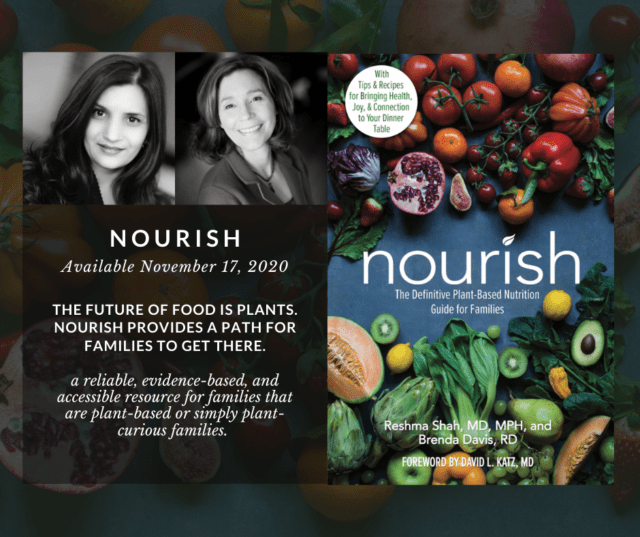
Interview Questions for Nourish Authors Reshma Shah and Brenda Davis
Can you tell us why you wrote this book?
The evidence is strong and consistent that there are many benefits to eating more plant foods, from improved health outcomes, to environmental sustainability and ethically informed food choices. This book provides families who are plant-based or simply plant-curious with a comprehensive guide (including the why, what, and how of plant-centered diets) to safely and confidently raise healthy plant-based children. We wrote this book to fill a void in the plant-based and pediatric nutrition literature.
What are the main reasons parents are choosing to raise children on plant-based diets?
Plant-based diets have been shown to reduce the risk of developing many of the chronic diseases that contribute to both morbidity and mortality throughout the world including heart disease, diabetes, cancer, and many other chronic conditions. Additionally, plant-based diets are the most environmentally friendly, and the only dietary approach to address the ethical concerns around factory farming and animal agriculture.
Are plant-based diets safe and adequate for children?
In its 2016 position statement, the Academy of Nutrition and Dietetics unequivocally stated that well-planned plant-based diets are safe and nutritionally adequate during all stages of the lifecycle, from pregnancy and lactation, through infancy, childhood, adolescence, and adulthood and even for athletes. Studies have shown that children eating plant-based diets that are sufficient in calories, variety, and appropriate supplementation, grow just as well as children eating omnivorous diets. Additionally, children eating plant-based diets have improved dietary quality with increased intakes of health-promoting foods such as fruits, vegetables, legumes, nuts, and seeds and decreased consumption of sugar-sweetened beverages and saturated fat.
How can parents ensure sufficient protein without meat and sufficient calcium without milk?
Our society conditions us to believe that meat is needed for protein and cow’s milk is needed for calcium. But when you consider that that fortified soy milk has as much protein and calcium as cow’s milk, and tofu and veggie meats have as much protein as meat, you can easily come to realize that people of all ages and activity levels can get enough protein and calcium from plants. Not only can we design a diet to provide plenty of plant protein (by including a variety of plant foods such tofu, lentils, nuts, seeds, and whole grains), but multiple studies have demonstrated increased longevity and reduced risk of disease when proteins come from plants instead of animals. Plant-based diets need to be designed to include adequate calcium sources. Adequate intakes can be ensured by including plenty of calcium-rich plant foods such as fortified non-dairy milks, calcium-set tofu, low-oxalate greens (e.g. kale, broccoli, bok choy), white beans, tahini, and almonds.
Are there any advantages to plant-based diets for children?
Not only can children eating plant-based diets achieve adequate growth and development, but the overall quality of the diet in plant-based children tends to be better (more fruits and vegetables, higher in fiber, lower in saturated fat). We know that many chronic conditions such as hypertension, high cholesterol, and even diabetes can begin developing during childhood, and plant-based diets can reduce the risk of developing these diseases.
Are there any potential drawbacks of plant-based diets? Do parents need to be concerned about nutrients and supplements?
Plant-based diets, just like any other diet, need to well-planned in order to maximize nutritional benefit and minimize risk of nutrient deficiencies. Plant-based diets can be particularly high in fiber. While this is generally a good thing, for small children a diet too high in fiber can make it challenging to meet caloric needs, so including some more refined foods (e.g. pasta) and plant foods lower in fiber (e.g. tofu) can be helpful. Additionally, most Western diets are fortified with vitamins and minerals (vitamin D in milk, iron in infant cereal) to safeguard against nutritional deficiencies. Depending on a variety of factors (regular consumption of fortified foods, geographical location, variety of diet, etc.), people eating plant-based diets may consider specific supplements such as vitamins B12 and D, iodine, and omega-3 fatty acids.
What can parents do to foster a healthy relationship with food in their children?
The simple act of serving and enjoying a variety of foods in a pleasant environment practiced with patience and persistence is one of the most powerful things parents can do to foster a healthy relationship with food for their children. It’s best to avoid pressure, praise, and most certainly restricting food when it comes to children. Try to be a good role model by enjoying and eating a variety of delicious, healthy foods and provide them regularly to your child.
How can parents cultivate a love for a diverse range of healthful, whole foods?
Involving children with shopping, prepping, and cooking can encourage them to try new foods and flavors. Additionally, it’s important to remember that it can take upwards of 15 times of offering new foods in a neutral and pleasant environment before a child will readily accept them. Eating seasonally is another way to increase enjoyment and variety in the diet
Can you explain the division of responsibility in feeding? What are common mistakes parents make when it comes to feeding (bribing, negotiating, forcing, restricting).
The division of responsibility is a feeding approach established by renowned feeding expert, Ellyn Satter. In it, Satter outlines the responsibilities of both parents and children when it comes to feeding. Parents are responsible for the what, when, and where of feeding (we will have split pea soup with salad, and bread at 6 pm at the kitchen table) and child is responsible for whether and how much of each food is eaten. It’s a balance of providing leadership/structure with feeding (regular meals and snacks, with adequate nutritional variety and composition) and autonomy with eating.
Why are regular family meals so important to a child’s physical, intellectual, and emotional development?
Family meals have been shown to be protective against a variety of negative child and adolescent behaviors and outcomes (extreme dieting, substance use, stress, anxiety, depression, low self-esteem) and to promote academic success, family connectedness, positive body image.
Finally the nutrition guide that parents have been waiting for!
A meticulously researched resource filled with expert advice for families that are plant-based or simply plant-curious.
NOURISH
The Definitive Plant-Based Nutrition Guide for Families
With Tips & Recipes for Bringing Health, Joy, & Connection to Your Dinner Table
By Reshma Shah, MD, MPH and Brenda Davis, RD
Popular documentaries like The Game Changers and Forks Over Knives have caused many adults to be curious about the benefits of a plant-based diet.
Nourish is an evidence-based, practical resource that explores the many benefits of a plant-based diet and provides parents with the tools they need to provide excellent and balanced nutrition to their families.
A proper, nutritious diet leads to healthier children. While nearly all parents agree, most feel that their children are not eating a healthy diet. This is not surprising, given the difficulties of navigating the nutritional landmines fueled by busy schedules, and confusing research about what diet is really best for health. Further, do the same rules for adults apply to growing minds and bodies?
In Nourish, parents will learn:
- How a diet centered around plants can optimize health, prevent chronic disease, care for our planet, and be an act of radical compassion.
- Nutrition specifics for all the stages of childhood—from pregnancy and breastfeeding all the way through adolescence.
- Tips, strategies, and mouthwatering recipes to bring all of this information to the dinner table as families explore the wonderful world of plant-based eating. Best of all, the authors don’t insist that families have to commit to 100% plant-based eating if they are intimidated. Simply changing up your family’s menu a week at a time can really make a difference.
“In the end, what sets Nourish apart is not that it is expert; it is. Not that it is insightful; it is. Not that it is wise, comprehensive, or evidence-based; it is all that. What sets Nourish apart is that it is all about food for love. Embrace this book, and it all but literally embraces you back. Is it a book, or a hug? Maybe both. Lean in, and let this beautiful book nourish your understanding, your motivation, your will-power and skill-power alike. Lean in- and taste the love. What could be more nourishing than that?”– David L. Katz, MD, MPH President of True Health Initiative and Founding Director of the Yale-Griffin Prevention Research Center
About the Authors
RESHMA SHAH, MD, MPH is an affiliate clinical instructor at Stanford University School of Medicine and has been a practicing pediatrician for nearly 20 years. She received her undergraduate and graduate degrees from Johns Hopkins University and her medical degree from Drexel University College of Medicine. She lives in the Bay Area with her husband and two children. Most Sundays, you can find her at the California Avenue Farmers Market in Palo Alto where she finds inspiration for weekly family meals. reshmashahmd.com
BRENDA DAVIS, RD is a registered dietitian and widely regarded as a rock star of plant-based nutrition. VegNews called her “The Godmother of vegan dietitians.” She has been a featured speaker at medical and nutrition conferences in over 20 countries on 5 continents and is the author of 11 books on vegetarian and vegan nutrition. In 2007, she was inducted into the Vegetarian Hall of Fame. She lives in Calgary with her husband, Paul. She has two grown children and two beautiful grandchildren. brendadavisrd.com
Website: nourishthebook.com
Note: Some posts may contain affiliate links. Should you choose to purchase a product, we will receive a small commission for the sale at no additional cost to you. Chapter Break is a participant in the Amazon Services LLC Associates Program, an affiliate advertising program designed to provide a means for sites to earn advertising fees by advertising and linking to Amazon.com.




